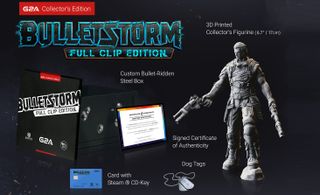TinyBuild CEO calls on game conferences to help prevent 'the Gearbox-G2A situation'
Alex Nichiporchik says busy game executives don't always have time to follow "industry drama."

The controversy surrounding the practices of digital marketplace G2A was brought into sharp relief earlier this month when a planned collector's edition of the Bulletstorm: Full Clip Edition, developed in partnership with Gearbox, went completely sideways. After YouTuber TotalBiscuit brought the arrangement to widespread (and very negative) attention, Gearbox demanded immediate changes from G2A and threatened to kill the deal if they weren't met. G2A declined, saying that its practices are already above-board in every way Gearbox wanted, and that was the end of that.
Through it all, a simple question hung in the background: How did Gearbox not see this coming? Gearbox CEO Randy Pitchford shuffled responsibility onto Gearbox Publishing chief Steve Gibson, and said that he (and implied that Gibson) had never heard of G2A prior to the blowup. To my mind, it was hard to imagine that highly-placed people in the industry, whose business is literally making and selling videogames, wouldn't be aware of one of the most notorious key resellers in operation. But in a recent blog post, tinyBuild CEO Alex Nichiporchik offered his take on how a deal like that could come about.
Nichiporchik began the post by saying that he too was initially baffled by the whole thing. In the wake of tinyBuild's own unhappy encounter with G2A last year, when it accused G2A of selling $450,000 worth of its games without paying it a single dollar, "it felt like everyone understood the situation and we haven't bothered with it much since," he wrote. But a little later on, as he was preparing for this weekend's Reboot Develop conference in Croatia, he noticed a familiar name on the speaker list: Marius (Mario) Mirek, the G2A senior account manager he'd butted heads with earlier this year at GDC.
Mirek's bio on the speaker's list describes him and G2A in fairly glowing terms, as you'd expect, and also identifies him "as the G2A staff member whom accosted Tiny Build at GDC and called them out on their torrent of accusations." Nichiporchik admitted that the description upset him, but insisted that his focus is simply trying to "understand how a deal like G2A and Gearbox could come about." He cited several examples of conferences where G2A had been rejected as a speaker and/or sponsor, presumably to buttress his claims of shadiness, but then mentioned another one that took place in October 2016, where Mirek had given a presentation on behalf of G2A.
"Imagine I'm an industry executive. Odds are I'm very busy running a large business, and don't have the time to follow industry drama about marketplaces. Then I see a marketplace positioned alongside very reputable companies, I wouldn't think twice about their reputation if they're next to CD Projekt Red, Apple, 343, Obsidian, etc. If a company I don't know is amongst reputable speakers, there's no reason for doubt in making a business deal with said marketplace," he said. "This is how I believe a deal like we saw with Gearbox and G2A could come together."
"Game conferences are the face of our industry, and I believe it's important for them to take responsibility for who represents it—potentially preventing situations as described with Gearbox," Nichiporchik concluded.
All of which makes sense, except for one point: If you're the head of a game publishing company, large or small, then I would think that having some awareness of who you're making deals with would be part of your job. This isn't just "industry drama," this is a company you're doing business with that stands accused of hosing a fellow publisher out of its share of nearly a half-million bucks. Of course the guy making the presentation is going to present it as a shining beacon of awesomeness; Gearbox once said that Aliens: Colonial Marines was going to be a great game, after all. But if you're just taking a guy at his word because he managed to secure a speaking spot at a conference in Moscow, then whose fault is it really when things go flop?
PC Gamer Newsletter
Sign up to get the best content of the week, and great gaming deals, as picked by the editors.
Andy has been gaming on PCs from the very beginning, starting as a youngster with text adventures and primitive action games on a cassette-based TRS80. From there he graduated to the glory days of Sierra Online adventures and Microprose sims, ran a local BBS, learned how to build PCs, and developed a longstanding love of RPGs, immersive sims, and shooters. He began writing videogame news in 2007 for The Escapist and somehow managed to avoid getting fired until 2014, when he joined the storied ranks of PC Gamer. He covers all aspects of the industry, from new game announcements and patch notes to legal disputes, Twitch beefs, esports, and Henry Cavill. Lots of Henry Cavill.
Most Popular




